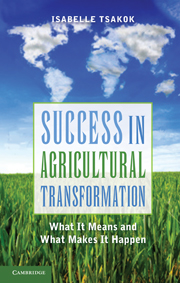Book contents
Summary
Introduction
This appendix sets out the methodology of research undertaken in this book and how it compares with three widely used approaches to assessing and learning about causality from non-experimental data. These approaches use the following:
Case studies as anecdotes to support or illustrate selected hypotheses about some aspect of growth, development, and poverty reduction and to glean lessons;
Cross-country regression analysis to estimate statistically significant or significant Granger causality coefficients, from which inductive inferences are derived to form the basis of universal statements about impact and causality; and
General equilibrium or sector-wide modeling to assess the magnitude and direction of impact of given exogenous shocks to the economic system as structured in the model.
The approach here differs from these three. The book develops testable hypotheses to explain well-known events in economic development. Then it tests these hypotheses against rival theories, using both cross-country data and case studies drawn from economic history and post-WWII development.
- Type
- Chapter
- Information
- Success in Agricultural TransformationWhat It Means and What Makes It Happen, pp. 307 - 342Publisher: Cambridge University PressPrint publication year: 2011



